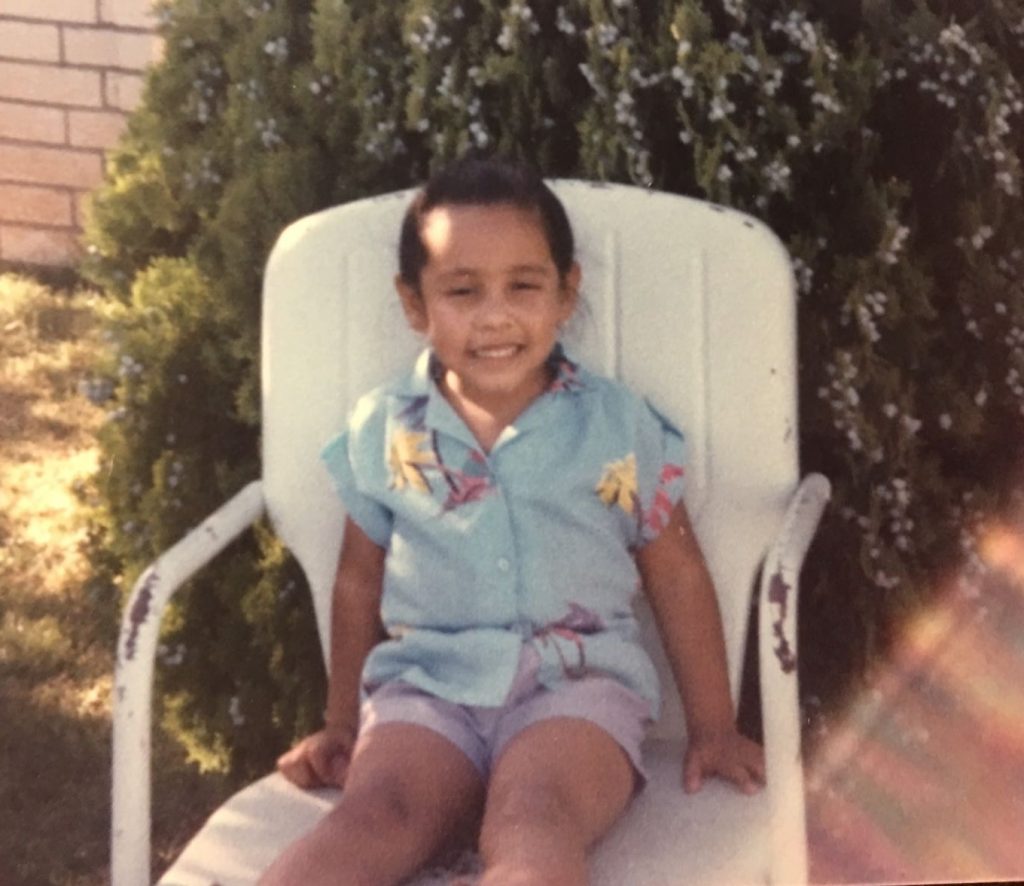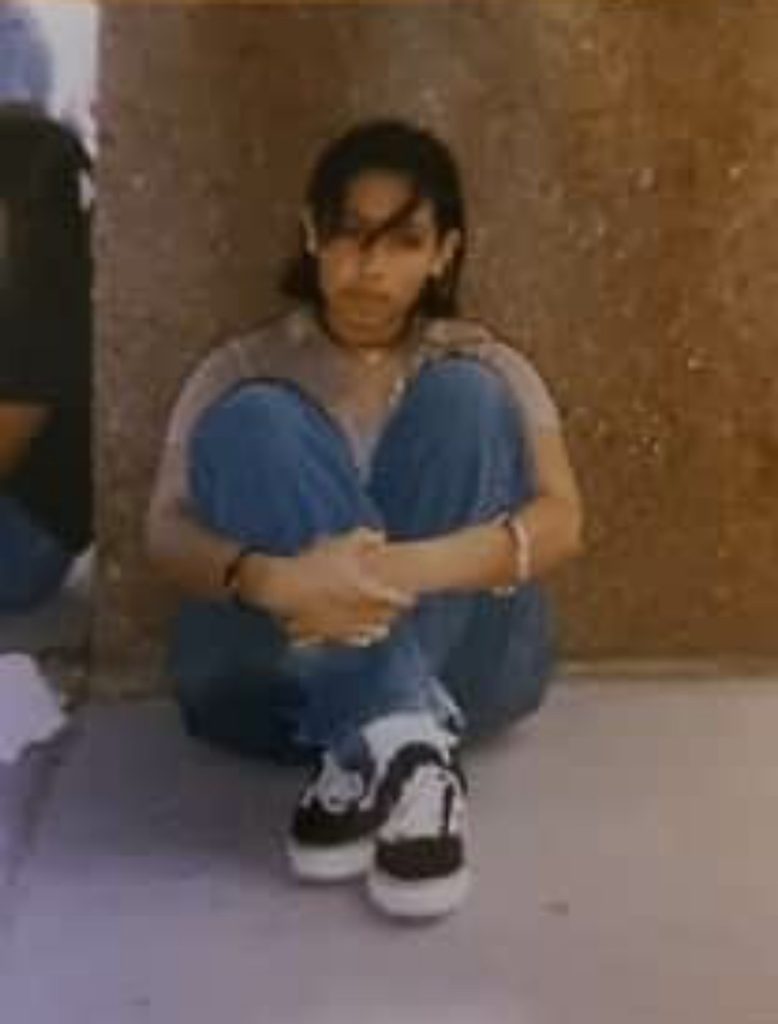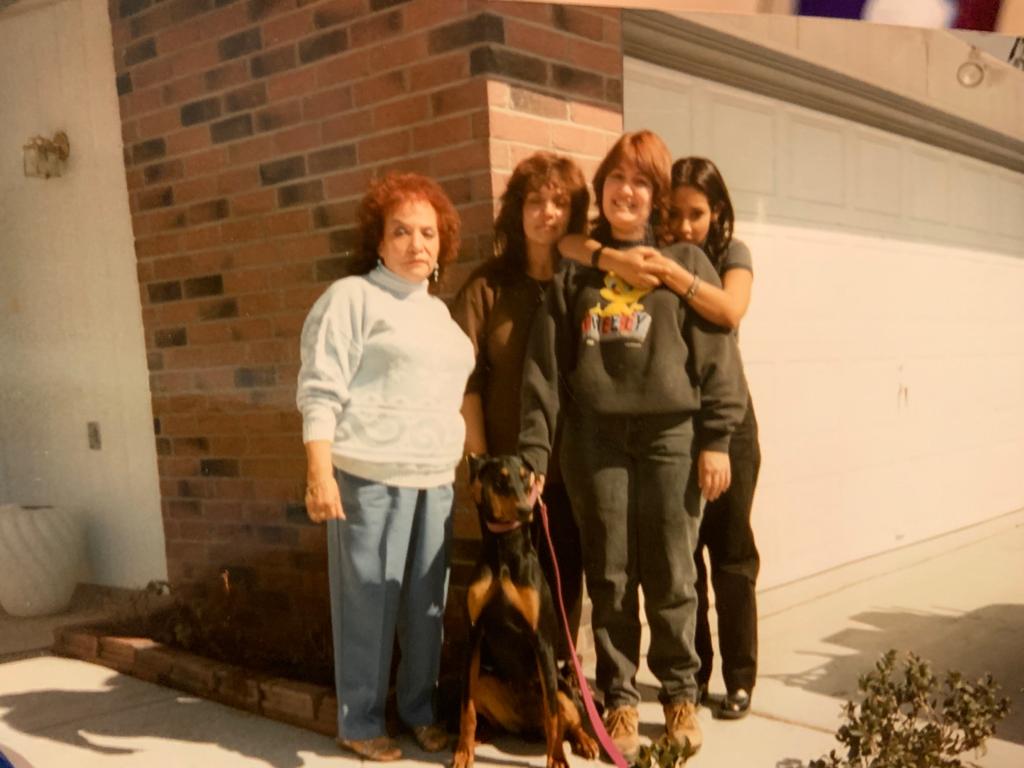In this guest post, author Yasmín Ramírez describes how embracing her name helped embrace where she comes from and who she has become, tilde and all. Yasmín is a Martha’s Vineyard Institute of Creative Writing Author Fellow and recipient of the Woody and Gayle Hunt-Aspen Institute Fellowship Award. Her debut memoir ¡Ándale Prieta! will be published April 19 and is available for preorder.
I was three and a half when someone mispronounced my name for the first time. We were at a Christmas party at the El Paso Orthopedic Group, where my mom worked one of her part-time jobs as a bookkeeper. The office had been transformed into a holiday wonderland with bright multicolored lights and twinkling tinsel. The best part? Santa was passing out gifts to all the children.
A faux rosy-cheeked Santa held a wrapped rectangular box up in the air and called out, “Yes-man? Yes-man?”
After a moment, my mom raised her hand and pointed down at me. I looked up at her with wide eyes. They hadn’t called my name.
“Ándale, mamas. That’s you,” Mom nudged me forward.
It’s at this part of the story my mom tells me I walked toward the Santa, put my hand on my hip, and said, “My name is Yas-mean!”
The room paused, then Santa grabbed at his belly, ho ho ho’ed, and everyone erupted in laughter. He didn’t attempt my name again.

Growing up, I was always the only Yasmín. At the time, some—cough—years ago, pre-Disney’s Princess Jasmine, no one had my name or its variation. Most of the time, people said my name correctly. Spanish speakers often tried to call me “Hass-mean,” which I hate to this day. “Ya! Yas-mean,” I reply every time. My mom tells me that my dad could never say my name. If I mine my memories, I think I hear, “Jess-mean,” but I could be making that up. Maybe that was a sign from the beginning.
When I moved to Dallas, it was the first time I’d heard my name pronounced “Yas-min.” The anglicized version sounded odd, but I was so overwhelmed by this new white space that I didn’t dare correct people. This is also where I became “Yas-min Ram-ear-ez” or “Yas-min Ram-rez.” I quickly acclimated as best as I could. In this place, only a handful of people said my name correctly. This was also when a Pakistani woman yelled at me at my first job in the Metroplex, a place called Garden Ridge.
“Yas-mean?” she asked as she read my nametag.
Shocked to hear my name pronounced correctly, my head popped up from scanning items, and I nodded like a bobble head.
“You Pakistani?”
“No,” I said with a shake as I scanned her glass candle holders.
She stayed quiet for a moment, but I felt her dark-eyed gaze hard on me as I continued to scan. My cheeks heated.
“You Pakistani!” she insisted.
I shook my head, “No. I’m not. I’m from El Paso.”
Her blank gaze let me know she had no clue where my home was.
“El Paso. Near Mexico?” I pointed to myself, “Hispanic. Latina. Mexican?” I added, hoping this might ring a bell.
By this point, I had finished bagging her items, but she hadn’t made a move to leave. She squinted at me.
“Pakistani!” she pointed.
I backed away from her finger, “No!” I exclaimed, “Latina. Yas-mean Rah-me-rhez!”
She frowned and left, mumbling something under her breath in her native language. I moved to the next customer slowly, not entirely understanding what had happened. It was the first of many, many, many times I’d have to explain my ethnicity while living in Central Texas.

When I Google my name, it says, “The name Yasmin is a girl’s name of Arabic, Persian origin meaning “jasmine flower.” I don’t know how or why my mom picked the name Yasmín. In fact, for most of my life, I thought that the accent in my mom’s scrawled writing was a dot over both I’s. It wasn’t until I was working on a section of my memoir, ¡Ándale, Prieta!, that I learned of the accents.
“How do I write Yasmín phonetically?” I asked my partner.
I sat at the kitchen table, trying to write while he cooked dinner.
He paused, knife in hand, and looked at me, “Yas-mean,” he spelled out, “Why?”
“I’m trying to show how people in Dallas said my name wrong.”
“Well, it’s because you don’t use the accent.”
I looked up from my laptop, “Accent?”
He nodded.
“What accent?”
“En Yasmín there is a tilde on the i. There’s one on Ramírez, too, but the gringos Mexicanos don’t use tildes. That’s why no one knows where the emphasis is.”
I frowned, “There isn’t an accent on my name.”
He grinned and nodded, “There is.”
“Nope,” I leaned back in my chair and crossed my arms.
“Yup,” he mimicked back.
“Wanna bet?”
A few minutes later, I was on the phone with my mom, “But why didn’t you ever tell me there were accents on my name?!”
My partner’s smile couldn’t get any larger on his big smug head.
At first, I was hesitant to start using the accents on my name. I felt like an imposter. Yasmín was someone who had always been in touch with her Mexican culture. She knew how to write in Spanish and used tildes as easily and freely as salsa en sus tacos. Meanwhile, my whole life, I’d been Yasmin. La chica pocha, whose Spanish was so so on any given day and whose cheeks flushed when she fumbled over verb conjugations.

But, if I’ve learned anything from writing ¡Ándale, Prieta!, it’s that I come from generations of chingonas who aren’t afraid to tackle a thing. So, I started with the first and most important place. Social Media. Then I changed my website. Then I changed my email signature at work—until only the version of my name with tildes existed.
Using accents all the time is cumbersome. I’ve learned the PC short cuts to add them in, but on my main laptop, a Surface Pro, I have to manually change the language each time I want to use an accent. Sometimes, I don’t want to do it. I get lazy. Why does using accents on computers have to be so pinche hard? Then I think about the years I didn’t use them, and how writing ¡Ándale, Prieta! guided me down this path to who I’ve become, tilde and all.
Watch the book trailer for ¡Ándale, Prieta!
Order your copy of ¡Ándale Prieta!:
Lee & Low Books
Indie Bound
Bookshop
Amazon
or wherever you order your favorite books!
Yasmín Ramírez is a 2021 Martha’s Vineyard Institute of Creative Writing Author Fellow as well as a 2020 recipient of the Woody and Gayle Hunt-Aspen Institute Fellowship Award. Her fiction and creative nonfiction works have appeared in Cream City Review and Huizache among others. She is an Assistant Professor of English, Creative Writing, and Chicanx Literature at El Paso Community College. She stays active in the Borderplex arts community and serves on the advisory board of BorderSenses, a literary non-profit. ¡Ándale, Prieta! is her first book. For more information about Yasmín, visit her website at yasminramirez.com.










